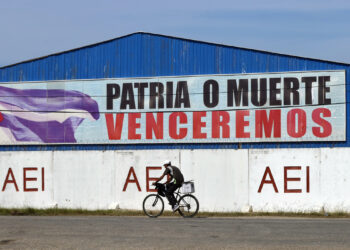A new baseball season starts in Cuba. To say “new” is just a phrase. Everyone knows that the National Series sooner or later will eventually become (there will be nothing to prevent it) a Caribbean’s professional league, with private clubs, sponsors, ads for mobile telephony over the stands and beer advertising in uniforms, but for now we continue with this Series dragging the worst part of the National qualifier: not that it is old and outdated, but that seems to be developing into another dimension. In a time bubble.
Now, if somebody asked to me, which fortunately nobody does, where I want the baseball to move to in the island, I would answer that in the late nineteenth century. To the time that there were magazines like The Pitcher (1887), The Score (1888), The Petit Havana (1900), The Petit Almendares and La Cancha Habanera (1902), among others. Towards those publications that were announced, each as sports and literature Weekly. Anything more modern than that? (In Cuba we have forgotten what it is a weekly.) And my favorite, the one that I think we should bail immediately, print it in the present without renaming it: The Comiquito. Journal of theaters, literature, music, fine arts and sports (1899).
When the ball game stopped being an elitist practice in the twentieth century, its relationship with the local letters moved in various directions, transmuted into other pages. In fact, the review of the previous paragraph I just took it from the prologue by historian Julio Alfonso Felix to the anthology Escribas en el estadio. Cuban baseball stories published by Unicorn in 2007 and reissued a couple of years ago. This is a collection of recent Cuban fiction short stories, varied approaches and uneven quality. They have in common, among other things, a claim of baseball, as he writes “as an existential zone, intimate, more linked to personal commitments that each collective rhetoric”.
The first story in the volume is called “The Wall” and is, of course, by Leonardo Padura.
Padura does not let slip by an interview without mentioning the fact that he, rather than a writer, wanted to be a ballplayer. Or that he became a writer because he could not be a baseball player. (I keep waiting for a player to say that he really wanted to be was a writer) This primary affiliation with baseball Padura remembers and repeats like a spell; it has become a slogan, an aura. Of all Cuban authors, not just those included in this anthology, Padura is the only type that defines himself by the loss of the stadium.
In that wall bounces a ball thrown by a child. A man contemplates the scene through the window of his office; he leaves aside the work and goes out. The story is the encounter between the two characters.
The child’s name is Elmer and he wants to be a baseball player and engineer when he grows up: “As a player I will go outside and as an engineer are going to make many pesos” he says.
In 1989, when the text is dated, that talk was still possible. Padura had no reason to know that the engineers were about to be erased from the equation which results are the pesos. It doesn’t matter: even if it is forced to divide it into two halves, two professions, the aim of this child is more than clear and forms a unit. Money and Travel: two sides of the same Cuban longing.
“You know what, Elmer?” the clerk says. “Well, you do not know, but you must learn it. I also wanted to be a baseball player and engineer. But I’m not any of those things. ”
The type studied Economics-before leaving, he placed in the drawer of his desk a book on Labour Planning, what other, “because we received an orientation stating the need for the country to study that specialty and I had no courage to say no. “He now lives in a house that is falling on him and has not been able to make another childhood dream, born of reading the second book, which is acting as magnetic pole in the story-The Mysterious continent, by Jules Verne.
Australia, of course, as a symbolic projection, a metaphor, but above all as a euphemism. An understatement the size of a continent. “Anyway, they can shove Australia up their arse,” says the economist putting back the guayabera he had taken off to play around with Elmer. And then adds, “But keep practicing, that maybe you’re a ballplayer and engineer.”
The story reflects a trivial scheme: lost illusions are still there, bouncing off the frustration bouncing on that wall as the ball does (ah, the Wall); adults seen in the mirror of the child, the adult remains that child (the last line is his hope that Elmer can go to Australia someday), etcetera. What interests me is to point out the curious combination of baseball player-engineer: the centaur half amateur, this formula was invented by Padura twenty five years ago as a way of introducing capital in infant baseball dreams (some dreams who were also his).
The Series starts, I was saying, and hopefully the cameras and microphones of Tele Rebelde continue deaf and blind, disabled to capture under the cap the players, the “existential zone, intimate” the personal longing completely detached from the “collective rhetoric “(which in reality were never as collective). Within the national sport already another sport is gaining more and more fun: guess-this yes, this non-which players that are wearing today provincial jerseys will not be in Cuba for next season; who will be the next to head for MLB franchises.
Let bets come and the next player too. Behind, waiting, there are hundreds and thousands of Elmer, children and not so young, who want to go out and make a lot of pesos.










